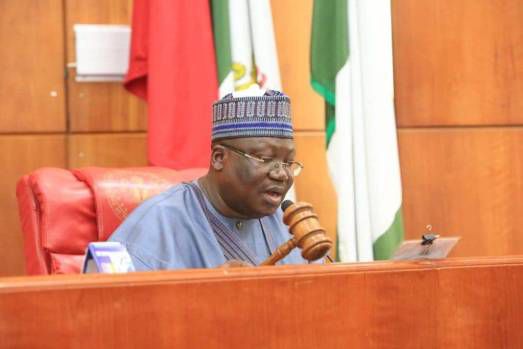
From his early days in the House of Representatives in 1999 to becoming Senate President in 2019 and holding office through some of the most contentious legislative cycles in Nigeria’s democratic history, Senator Ahmad Ibrahim Lawan represents the face of political longevity.
Who Is Ahmad Lawan?
Lawan is a Nigerian politician, academic, and former Senate President who has been representing Yobe North in the Red Chamber for nearly two decades. He is widely regarded as the longest-serving federal lawmaker of the Fourth Republic, having served continuously from 1999 to date.
Profile Summary
-
Full Name: Ahmad Ibrahim Lawan
-
Date of Birth / Age: January 12, 1959 (66 years old as of 2025)
-
State of Origin: Yobe State
-
Local Government Area: Bade (Gashua)
-
Tribe / Ethnicity: Kanuri
-
Religion: Islam
-
Marital Status: Married
-
Political Party: All Progressives Congress (APC)
-
Former Position: President of the Senate (2019–2023)
-
Years in National Assembly: 1999–2023
-
Estimated Net Worth: ₦9–12 billion
Early Life and Education
Lawan was born on January 12, 1959, in Gashua, a semi-rural town in the Bade Local Government Area of Yobe State. He grew up in a modest northern household rooted in Islamic values, discipline, and education.
His early exposure to underdevelopment in the North-East would later influence his interest in public service and legislative reform.
He began his primary education at Sabon Gari Primary School in Gashua and proceeded to Government Secondary School, Gashua. Lawan later studied Geography at the University of Maiduguri, graduating with a Bachelor’s degree before earning a Master’s in Remote Sensing from Ahmadu Bello University (ABU), Zaria.
He eventually pursued doctoral studies in the United Kingdom, obtaining a PhD in Remote Sensing and Geographic Information Systems (GIS) from Cranfield University.
Career Before Politics
Before contesting elections, Lawan worked as a lecturer at the University of Maiduguri, where he taught geography and environmental science. He contributed research to issues affecting northern Nigeria, including land degradation, water resource planning, and desert encroachment.
He later joined the Yobe State Civil Service as an Education Officer in the state Ministry of Education in 1985 and 1986, gaining administrative experience that fed into his later legislative career. Initially rooted in academia, he would eventually channel his expertise into the legislative space following Nigeria’s return to civilian democracy in 1999.
Political Career
Entry into Politics
Lawan entered politics in 1999 and was elected to the House of Representatives under the platform of the All Nigeria Peoples Party (ANPP), representing Bade/Jakusko Federal Constituency.
He spent two terms in the lower chamber before contesting and winning a Senate seat in 2007. From then on, he became a permanent figure in the National Assembly.
Major Political Roles
Lawan remained a senator for Yobe North across successive election cycles and later joined the All Progressives Congress (APC) during the realignment that preceded the 2015 elections.
In June 2019, he was elected President of the Senate of the 9th National Assembly. His leadership style was characterised by a cooperative relationship with the executive arm of government, a posture that generated both praise and criticism.
In 2022, Lawan purchased the APC presidential nomination form and contested in the party’s primaries, where he lost. After the defeat, he returned to seek the Yobe North senatorial ticket, a ticket that had already been won by Bashir Machina in a validly conducted primary.
Although Nigeria’s electoral law prohibits candidates from contesting two offices in the same election cycle, the dispute escalated through the courts until February 2023, when the Supreme Court declared Lawan as the APC candidate. The judgment displaced Machina and sparked national debate on party democracy and the extent of political incumbency.
Achievements and Impact
Under his Senate presidency, several major reforms were passed, most notably the Petroleum Industry Act (PIA), which restructured Nigeria’s oil and gas legal framework after decades of delay. The Senate also passed amendments to the Electoral Act, reforming candidacy rules and voting infrastructure.
Lawan also channelled attention and resources to the North-East, particularly at a time when Yobe and neighbouring Borno were affected by insurgency and socio-economic decline. His long tenure gave him substantial institutional experience and bargaining power within federal politics.
Personal Life
Lawan is married with children, though he keeps his family life away from media attention. He is a devout Muslim and maintains a quiet personal profile outside national politics. Known for his calm disposition and soft-spoken style, he is seen as a consensus builder rather than a confrontational figure. His academic background continues to reflect in his more reserved public persona.
Net Worth and Assets
Lawan’s net worth is estimated between ₦9 and ₦12 billion, accumulated from long-term public office, property holdings, and private investments. He reportedly owns residential real estate in Abuja and Yobe State, along with undeclared business interests.
Like most senior lawmakers, his complete asset declarations are not public, but he has not been directly indicted in any major corruption case.
Awards
-
National Merit Award as Commander of the Order of the Niger (CON)
-
Sardauna Legendary Pillar of Exemplary Leadership Award
-
Best Performing Senator in Yobe State by Yobe State Students’ Association
-
Best Senator in 2011 by Baseline Global Ventures
-
Fellow of the Institute for Government Research and Leadership Technology.
Legacy
Ahmad Lawan’s legacy is rooted in continuity, longevity, and institutional presence. As the longest-serving federal lawmaker of the Fourth Republic, his legislative career stands as a record in Nigerian political history.








